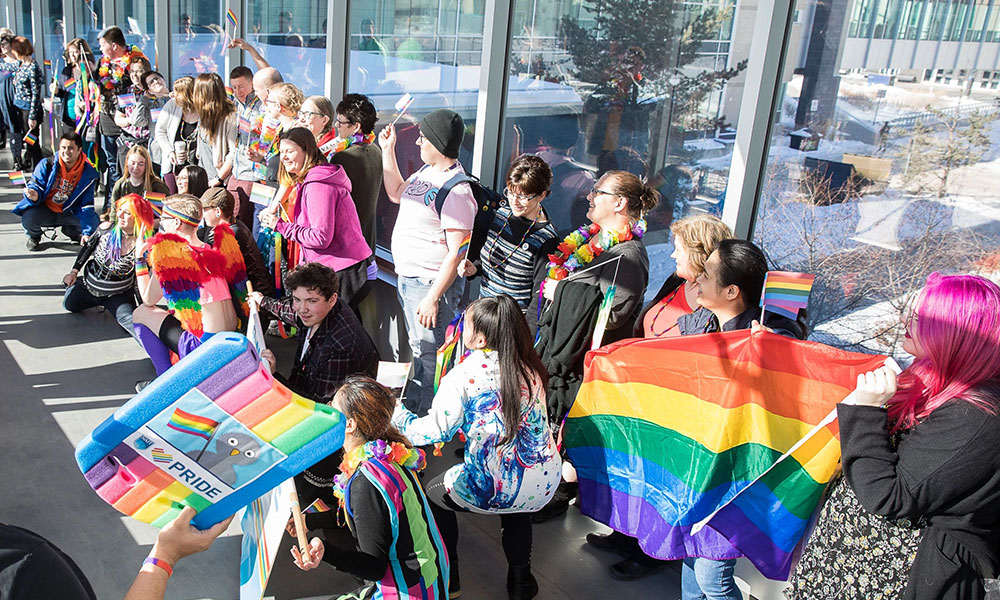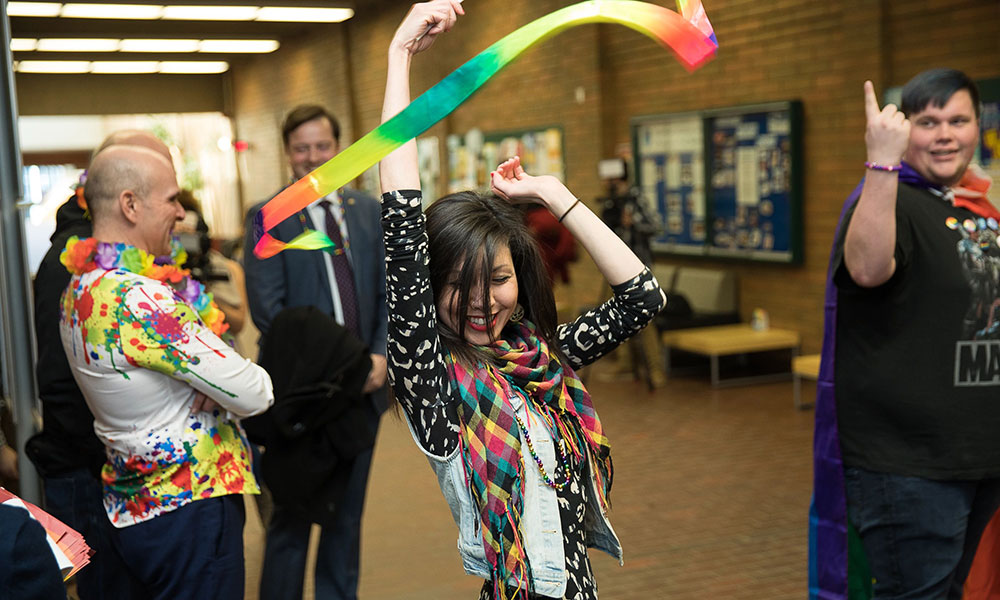Listen, show up, stand up
NAIT’s ninth Pride Week, celebrated in early March 2023, was marked by the raising of the pride flag on Main Campus – a show of solidarity and support and, overall, an indication that everyone is welcome at the polytechnic.
“Our community is stronger and healthier when students and staff feel they can bring their whole authentic selves to NAIT,” says Gerard Hayes, vice-president students and campus life. “We have taken steps to ensure that NAIT is an inclusive and supportive place for everyone. But there is still work to be done.”
In part, perhaps that’s what allyship to the 2SLGBTQIA+ is about: committing and remaining committed, pairing action with words, taking steps to always strive for a stronger, more diverse community, and recognizing there will always be more steps to take.
We asked members of the NAIT community of staff and alumni for their thoughts on what it means to be an ally and why it may be more important than ever. Here’s what they told us.
Believe, affirm and support
“I think in bare-bones terms, a queer ally has to believe, affirm and support that there are multiple ways to build physical and emotional intimacy [and] to create community and family-units; that these things are not dependent on the heteronormative expectations of heterosexuality, monogamy, marriage, procreation.
“A queer ally also, importantly, needs to question the embedded notion of binary gender norms – that category 'man' means x, and category 'woman' means y. These rigid gender expectations not only harm our trans and gender fluid community members, they also harm cis gendered men and women with their narrow and limiting confines.”
- Natasha Pinterics, EDI Specialist, NAIT’s Office of Equity, Diversity and Inclusion
Listen, learn, act
“Allies are needed. Allies are essential. The 2SLGBTQIA+ communities need allies now more than ever to stand behind, stand with and, sometimes, stand in front of. Not only during pride celebrations, but all year long. The first and most important step in being an ally, is asking the people you are supporting how you can be their ally. Be open to listening, learning and acting.”
- Marni Panas (Computer Systems Technology ’02, Management '91)
Use your power and privilege

“As a cis-gender, heterosexual, white woman leading EDI work on behalf of a NAIT, I think about allyship a lot. My identity affords me a certain amount of power and privilege that is not available to equity-deserving groups, including gender and sexually diverse communities.
“For me, allyship is about listening to queer communities, learning from their lived experiences, and choosing daily to use my power and privilege to address inequities inflicted upon 2SLGBTQ+ individuals.
“Practically, I engage in allyship when I amplify the perspectives and ideas of queer colleagues and students when they are not represented. I engage in allyship when I advocate for queer individuals to sit at tables where decisions are made that impact them. I engage in allyship when I champion projects that centre around the needs of trans and gender-diverse individuals, such as expanding the gender identity options for staff, adding pronouns and chosen names to public-facing systems at NAIT, and advocating for gender-inclusive washrooms.
“Although I regularly practice allyship, I cannot claim the term “ally" for myself. I can only call myself a 2SLGBTQ+ ally if I am gifted that title by a member of the queer community.”
- Madlen Christianson, Manager, NAIT’s Office of Equity, Diversity and Inclusion
Do the hard things

“In the past, I would have focused on the importance of listening and treating people as they want to be treated and being open to continually learning, all of which I do still believe. But right now, things are scary, and I can’t say that that’s enough.
“While we are not currently seeing the same increase in anti-trans health care and anti-drag legislation that other countries are (particularly the U.S. and the U.K.), we are seeing the same cultural forces, protests, accusations and attacks.
“We need allies who are willing to do hard things at this time.
“We need people to question and push back against stories that are using fear to paint queer people as predators or trans health care as a risk. We need people to show up and protect us when we are being attacked or protested. We need people to not financially support those (and the work of those) who advocate against us, even when it means giving up things they enjoy. We need people to instead support the causes that are giving us shelter, safety and support. And we need people to believe us when we say what we need.”
- Linden Couteret, Student Resolution Officer, Academic Portfolio Operations